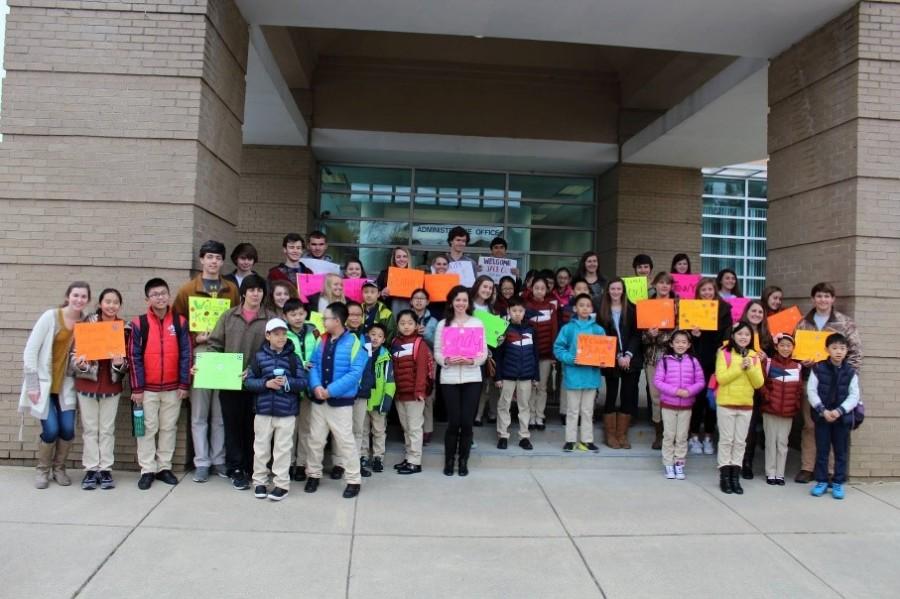An Inside Look at the RMA Haiwai Partnership
March 8, 2016
After the much anticipated arrival of the fourteen Chinese students from the Beijing Haidian Foreign Language School, the new students have started acclimating to their new homes, friends, classrooms, and American culture as a whole. Although these changes could potentially be difficult for these children, who range from third to fifth grade, they have adapted to this culture shock remarkably well. This smooth transition was made possible partially by the foresight of administrators from both RMA and the Beijing Haidian Foreign Language School, which is also known as Haiwai.
Of these administrators, Ms. Covolo and President Li were the main initiators of the project, however, Mrs. Martha Lancaster, the head of lower school at RMA, and Rose, the head of lower school at Beijing Haidian Foreign Language School have communicated constantly about logistics regarding the exchange between the two lower school departments. Like the new Chinese students, Rose has been given an American name to make communication easier. Her actual name is Huang Ruihua. While Rose was in the U.S. for three weeks to oversee the arrival of her students and to make sure everything ran smoothly, I was able to sit down with her and Mrs. Lancaster for a candid interview about the program’s initial development, its current state, and future plans for further partnership.
Read the interview with the two heads of lower school to learn more.
Lindsey Ross: When did you two first meet?
Martha Lancaster: We met in May 2015 when President Li and other administrators toured RMA for the first time.
LR: Rose, what were your first impressions?
Rose: I liked the state, the weather, and the people. Everyone, especially Beth and Martha, were very nice. The students, teachers and parents were kind and welcoming then and still are, which makes us feel like old friends.
LR: Has communicating been difficult because of the language barrier or difference in time zones?
ML: Well, Beth has been the main liaison on behalf of RMA for this program. She had been corresponding with President Li, the headmaster of Haiwai, by email since October of 2014. President Li and a majority of the administrators speak English so that has been extremely helpful.
LR: What do you two think the most difficult obstacle has been for the children to overcome?
ML: Learning in an English only environment has been difficult for the children. They are very strong in math, but the other majority of school subjects that are English based are hard for them. We wanted them to feel at ease.
R: The teachers and students here give our students lots of individual help on assignments which has helped them. When they leave school each day, our Chinese teachers will help them, but one on one help from teachers is best. The first day, the students weren’t nervous, but I was! They love going to school and think it’s fun.
LR: Rose, I would think that coming into a new culture would be stressful or confusing for the children, how have you and your administrators worked to mitigate the culture shock?
R: When the kids come home from school each day, the teachers act as parents and help with homework, cook, do laundry, and help clean. The students are comforted by this presence like their Chinese friends at BHFLS in Beijing who are also taken care of by their teachers, except they go home to their parents on the weekends. The Chinese students at RMA have written letters to their classmates back in Beijing and talk about the nice people here so that is good to hear. We also take the children on an outing each weekend. We have gone to the NC Art Museum and the Marbles Kids Museum in Raleigh so far, and are going to UNC- Chapel Hill next weekend. Over Spring Break, we are going to visit Washington, DC and Duke University.
LR: What is the ultimate goal of this relationship?
ML: We want an international blend for lower school students that usually happens in high school. This program is also unique because these new students come in groups for one semester only. With this program, American students have also been able to learn basic Chinese in classes after school each Tuesday and Thursday. These classes are taught by their Chinese friends and is a great way to share experiences.
LR: Now that this program has officially begun and appears to be successful, what would you consider the most rewarding experience so far?
ML: Overall, the entire experience has been rewarding. Even with small obstacles, everyone involved are wonderful to work with, which makes dealing with any issue easy. The only minor issue that we had was when the Chinese students ate in our cafeteria for the first time and were amazed with all of the choices and decided to eat loads of entrees and desserts which made them sick later on. Now they have portions and set menus so that problem was easily fixable.
LR: Are there any future plans or goals in the works?
ML: Beth, Dr. K, and several students with their families are travelling to Beijing over Spring Break. Future travel plans for RMA teachers to travel to Beijing have been mentioned. This trip would help our teachers have a better understanding of the new students after seeing where they come from and what their daily lives are like.

